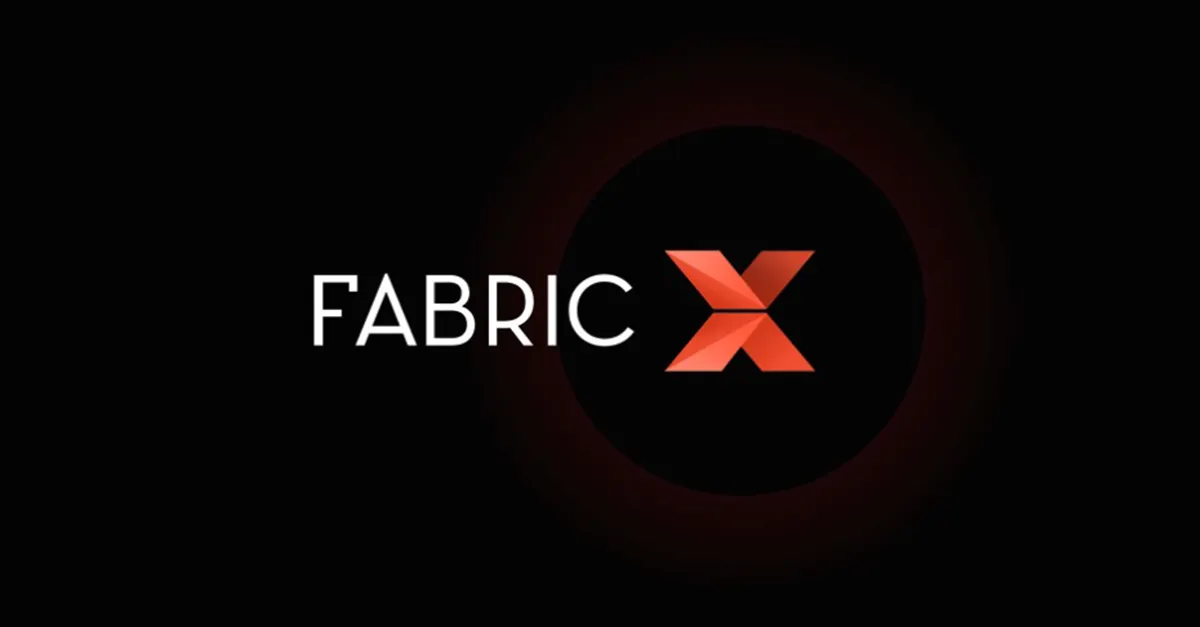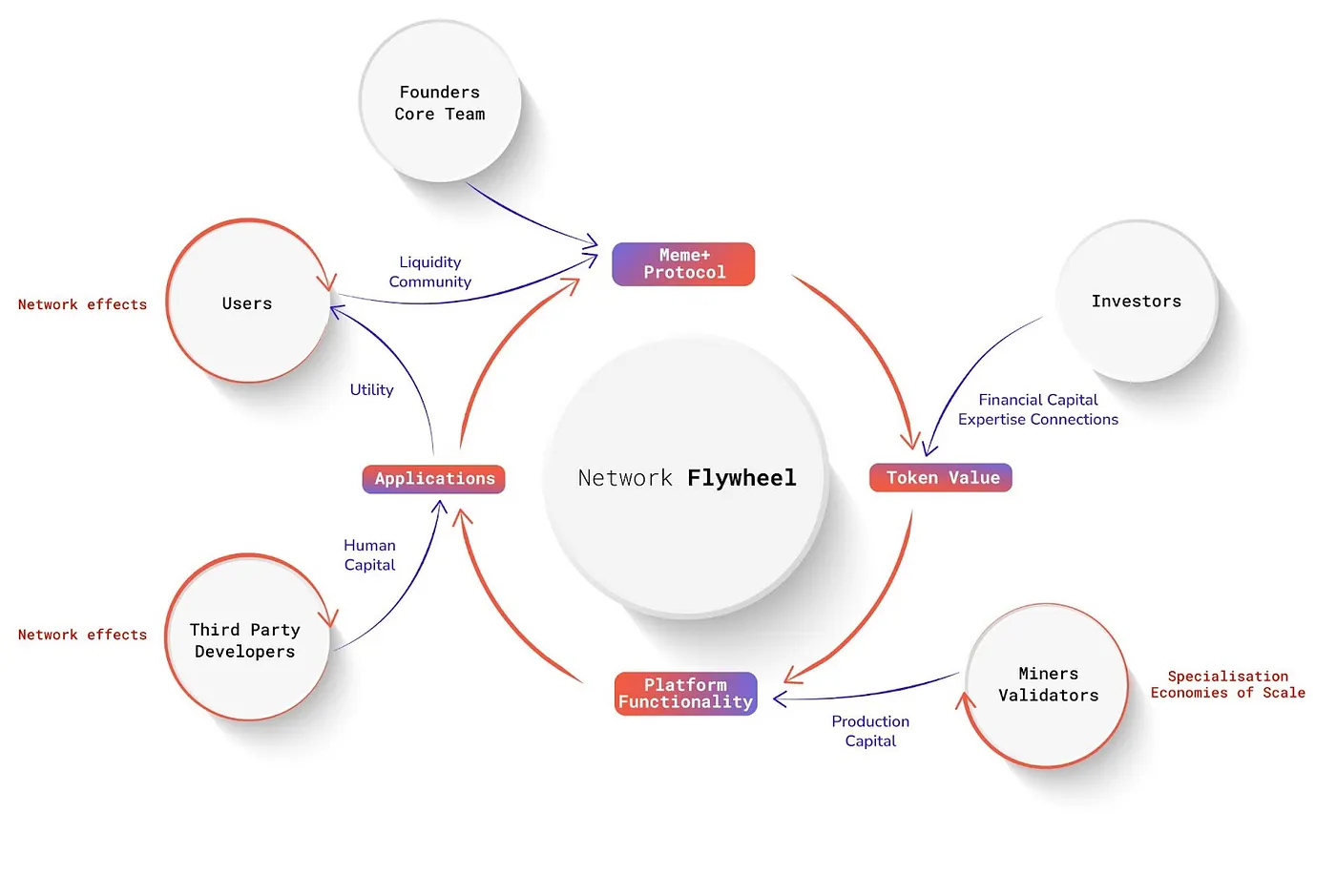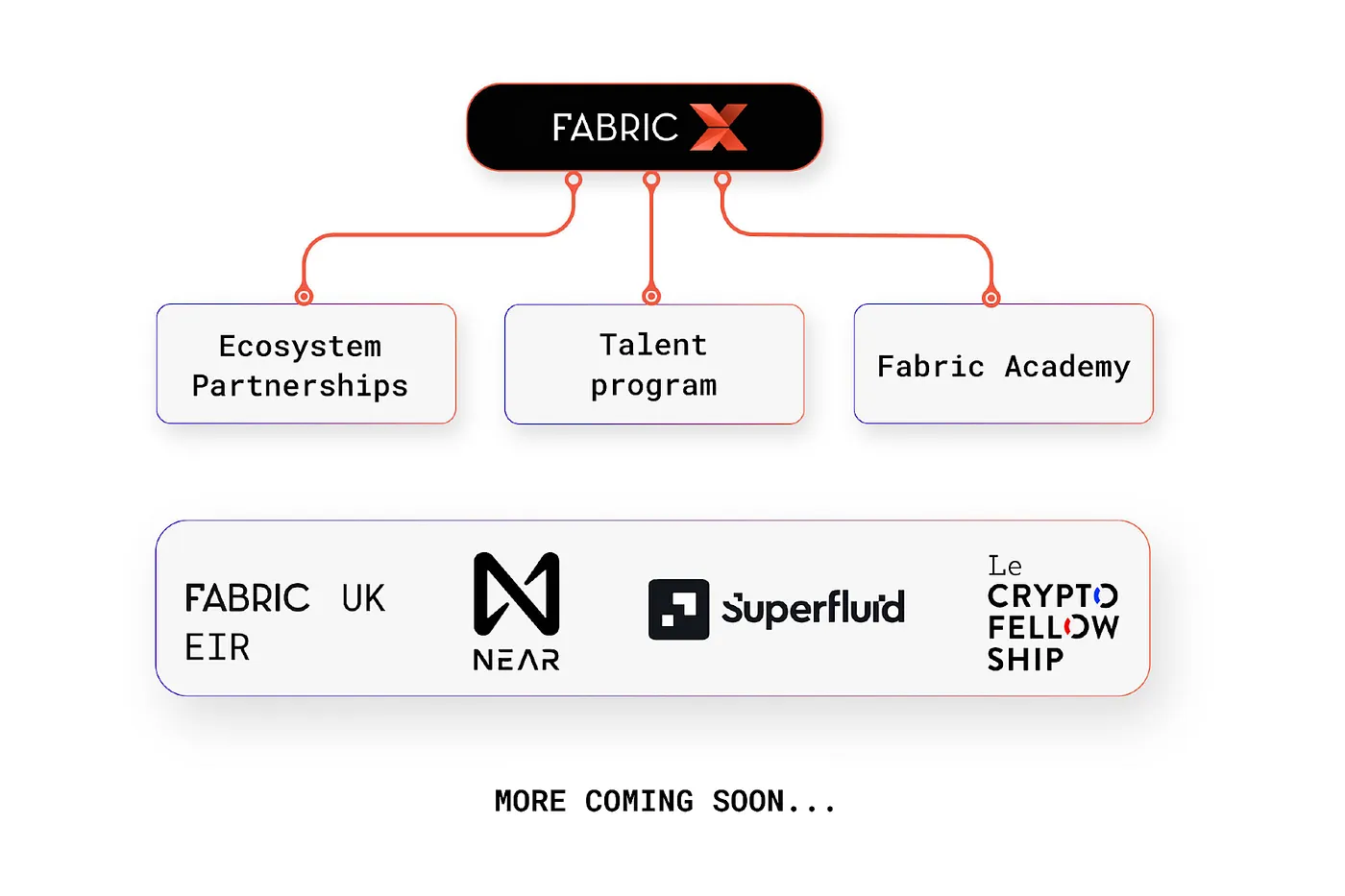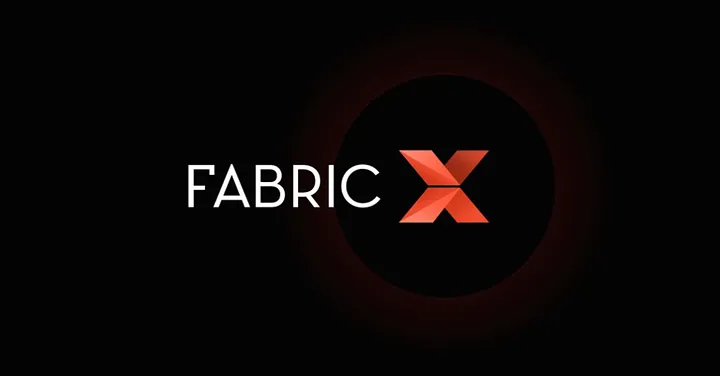Introducing Fabric X, our contribution to help weave Entrepreneurial Talent into the Open Web…
• • • • •

We’re happy to announce our commitment of 20€ million together with our ecosystem partners to the infrastructure required to support the next generation of Open Web Founders and here’s why…
Before we dive into Fabric X, we’d like to share some of our thoughts on network effects in the Open Web, as well as one of the main bottlenecks we see currently. A network effect is a phenomenon where each additional participant of a network adds value to all of the existing participants. Sometimes this effect can be layered between different groups of intersecting participants: developers, users, brands, locations, liquidity providers, buyers, sellers and even financial backers. Hence, each exponential growth driver can compound each other. At this point, each and every one of us have benefited from this as users of Web1 and Web2 platforms (Starting with Netscape’s Mosaic browser in 1993, Amazon vs Barnes & Nobles in 1994, the rise of search with Yahoo & Google in 1995/1996, The Facebook in 2004 — How the internet happened), in spite of the clear issues with the resulting extreme concentration of market power.
Powerful network effects need participants upon which to operate
The Open Web allows for powerful network effects that can lead to exponential growth. Yet, what makes Web3 projects unique is the democratized access and ownership of the web it enables; one which grows in value through stakeholder participation & contribution. Decentralized protocols can leverage tokenization to solve the cold start problem, build defensibility through their community (instead of around data silos), and constantly innovate thanks to an open-source and composable environment. Critically this is done by enabling users to own a share in the value they create — and we have termed this ‘modern mutualism’ or ‘collective capitalism’ (no alien topic to the team here at Fabric, as discussed in a number of previous posts and presentations). Networks are deepening this participation further by giving users a direct economic incentive to contribute to the ecosystem, creating a virtuous loop.

Despite the evident power of this interplay between networked communities, they are only as strong as their weakest link. Whilst it is certainly true that users and supply side actors in these open web networks still require education (be it on compliance related comfort or a call-to-action), we argue that it is the shortage of knowledgeable entrepreneurs and engineers (familiar with Solidity, AssemblyScript, Rust, or C++) — people that are able to develop and audit smart contracts; ship to production; model the token mechanics of these new digital economies; build authentic communities with distributed ownership and value add contributors — that are holding the movement back. As a result, fewer companies are started, less talent is attracted to the sector, and further scaling is seriously inhibited.
Interest in this new frontier is strong, but knowledge is thin & hard won
It’s not that the interest-level is low — interest in posted crypto jobs has risen by about 5 to 10 times in the past nine months, according to Neil Dundon, the founder of recruitment agency Crypto Recruit. In an emerging space such as this, there is no shortage of opportunities. But we see a significant gap between the requirements outlined in the job posts and the skills and knowledge of people who would be ready to jump into crypto. This shortage is driven on the one hand by the emergence of completely new business models powered by tokens & nft’s, new “company” structures like DAO’s and job titles like Community Managers (there are few people with that experience in Web 3). Beyond this, the shortage is of technical nature: there is already a lack of developers globally, and crypto developers are a niche within that (due to new system architecture, languages etc.). Yes, there are free courses to learn about blockchain (learning smart contract development on Ethereum with Berkley free courses; Crypto Zombies; the Ethereum Foundation; the Lambda school; this developer tools list published by Consensys, or a16z’s crypto startup school). And yes, there are plenty of sources to get the latest news (The Block, Rekt, Messari) to help entrepreneurs in innovating and staying up to date with the space. Yet there is room for more to be done, which is why we believe that the role of Venture Capital funds in the 3rd era of the Web, the Open Web, is to directly participate in this knowledge transfer — as a contributing stakeholder — by providing a trusted, experience driven, viewpoint in an industry that is fast evolving; peppered with cases of hype and fraud; clouded by uncertainties navigating regulation and ESG; and often befuddled by the choices in competing technologies, supercharged by the dynamics of open source with varied levels of maturities.
Founding and supporting founders is deep in our DNA
Fabric Ventures wishes to seek and support talent, because this is deep in our DNA. We are founders by heart. The Fabric team has itself co-founded Orchestream (managing many of today’s large-scale data networks); Tideway (automating change in many of the world largest enterprise data centers); loyalty & payment platform Yoyo Wallet; the Honeycomb Project at Sun Microsystems; RPX; SaaS platform OB10, now part of Tungsten; Orchid and of course Firestartr which is the predecessor strategy and sister partnership to Fabric Ventures. Then over the past decade or so, the Fabric (and historically Firestartr) team has supported the incubation of projects Orchid; Sunlight; DuelRing; Tixdaq / Fanatix; Rocket Sports Network; Rightster / Brave Bison, CognitionX (with its world renowned CogX conference) and both entrepreneurs resident in our offices (EIRs) and former team members have then gone on to Starkware, Flashbots and most recently a stealth project, backed by Alan Howard.
Beyond the usual venture capital industry provision of capital, networks and business guidance, we at Fabric Ventures have also been actively focusing on crypto research; establishing partnerships; acquiring talent; designing token economics and governance of decentralised organisations. These have been designed to help our portfolio companies absorb best practices and establish asymmetric capabilities faster, in order to build quicker ‘unfair’ advantages. This has already helped us find success recently with Sorare, Axie Infinity, Polkadot, Yield Guild Games and the co-building of BlackPool.
Going one step further
Back in 2009 we were inspired by Y Combinator’s early and disruptive success. As mentioned above, over the last decade we have experimented with intense EIR collaborations and explored numerous models for broadening this work. What we wanted was an approach that scales geographically; spans technologies and matches the pace in the fast moving world of Open Web.
Building on some earlier technology partnerships, this year we launched a pilot to address the lack of Open Web talent together with our partner Frst in France. It was dubbed Le Crypto Fellowship and you can jump here for the launch announcement. France made sense because of the concentration of successful break-out companies (Sorare, Aave, StakeDAO, Ledger, Sandbox etc…The Future of France!) and our proactive partner. The pilot has been an outstanding success, with almost 500 applicants with an inspiring level of talent from which our amazing fellows were selected. Now let us get to Fabric X…
Introducing: Fabric X

Today we are making public all our work in this space under the new brand of Fabric X: our contribution to the next generation of builders of the Open Web. It’s a set of initiatives that aims at arming entrepreneurs with the capital, capability, and community to build Open Web companies with maximum positive human impact; bringing us closer to a future where tech is trusted, accessible, and put to the best possible use. We are committing over 20m EUR in capital together with our ecosystem partners to support the first wave of entrepreneurs and builders. We believe that, together with our partners, Fabric X will empower entrepreneurs to shape the future of the global Open Web.
Given we want to take an approach that allows us to scale Fabric X both geographically and across technologies to match the fast moving pace of the Open Web, we have summarised the Fabric X initiatives as follows:
- Ecosystem Partnerships
- Fabric Talent Programme
- Fabric Academy
Ecosystem Partnerships: doubling down on existing communities
We take a platform and partnership approach to the knowledge and talent challenge: starting with identifying both emerging ecosystems in the Blockchain space and geographies with a concentration of talent/strong educational foundations. We align with partners representing the best of these communities, and support projects emerging from them with capital in order to create fertile ground for experimentation.
Beyond our existing initiatives, we’ve also put in place collaborations for ecosystem development development with Polkadot; Superfluid; Immutable; Flow/Dapper and NEAR (incl. an upcoming Near Hackathon), we have a number of further conversations underway with both established and emerging Open Web players. Fabric Ventures intends to act as a lightning rod for quality projects and assist platform partners in their selection process for grants, augmenting a platform’s offering with the Fabric in-house project development programmes. If you are an Open Web Ecosystems looking to seed more projects within your community, please reach out via x@fabric.vc
Fabric Talent Programme: investing in talent at scale
Fabric is launching a series of talent programmes in European cities beyond Le Crypto Fellowship. Our objective is to help several cohorts of top-notch entrepreneurs kick start their journey into the world of the Open Web. Each founder(s) will receive funding early on to support themselves for the first year in exchange for equity in the new business. We are already in discussions with partners in the UK (London), Germany (Berlin & Munich), Bulgaria (Sofia), Portugal (Lisbon), Russia (Moscow), and Switzerland. If you are a seed investment fund with geographic expertise, please reach out via x@fabric.vc
Fabric Academy: Web 3.0 masterclasses from our world class faculty
To help participating founders accelerate their journey and achieve maximum results, we are investing in a comprehensive curriculum with in-depth coverage of all relevant aspects of starting a high impact Open Web project, whilst concurrently providing access to the Fabric Advisory Network, filled with technologists and founders from the portfolio, Fabric family and wider Open Web community such as Trent McConaghy (Ocean Protocol), Illia Polosukhin (NEAR), Nicolas Julia (SoRare) and Dr Steven Waterhouse (Orchid). Key areas of our curriculum include operations such as dealing with legal & regulatory frameworks, hiring, Open Web business models and tokenomics, community building, go-to-market; as well as technical topics such as smart contract development and audits. Law firms, Talent agencies, Auditors and other crypto specialists who wish to host a masterclass or otherwise support the academy, please reach out via x@fabric.vc
What’s Next: it’s time to build
With the Open Web, we have a toolkit of unprecedented power, reach and opportunity. At Fabric Ventures we plan to encourage talented engineers and projects to embrace these new opportunities and not let a lack of in-depth knowledge on the subject prevent them from exploring more. For now, we are excited to see how these initiatives are shaping up and we will soon be announcing further details on Fabric X. But in the meantime, we are calling out to all builders, seed funds, academy contributors and ecosystem players looking to help shape the Open Web.
Email us: x@fabric.vc


